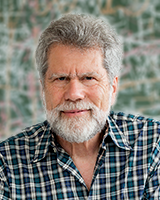Lorenz S. Cederbaum Receives Second ERC Advanced Grant
13 June 2016

Photo: Schwerdt
The European Research Council (ERC) has awarded Heidelberg researcher Prof. Dr Lorenz S. Cederbaum an ERC Advanced Grant for outstanding research leaders in Europe. The funding is earmarked for a project at the intersection of physics and chemistry to investigate fundamental physical processes in chemical systems. In particular, the research will focus on electronic decay processes in which the chemical environment plays an active role. ERC funding in the amount of approx. 2.5 million euros is being provided. The five-year project is set to begin in October 2016. Prof. Cederbaum teaches and conducts research at the Institute for Physical Chemistry of Heidelberg University. This is his second ERC grant since 2009.
In the "Efficient Pathways to Neutralization and Radical Production Enabled by Environment" project, Prof. Cederbaum and his team will be studying electronic processes that occur when multiply charged ions or slow electrons are present in the chemical environment. It is known that these particles are produced when biological systems are irradiated with high-energy light, such as x-rays. However, little research has been devoted to how these ions or electrons incur damage to the environment. The Heidelberg researchers hypothesise that electronic processes play a pivotal role.
According to Prof. Cederbaum, an ion that is multiply charged or surrounded by multiple molecules can absorb an electron from a neighbour. The energy released in that process releases a second electron from the environment, a process known as Electron Transfer Mediated Decay (ETMD). In turn, the slow electrons can dock onto molecules. This process, called Intermolecular Coulombic Electron Capture (ICEC), also releases energy, which causes electrons to be removed from the environment. The Heidelberg research team hypothesises that the removal of the electrons can indirectly damage the environment. "A detailed study of ETMD and ICEC processes in biological model systems is therefore extremely important for our knowledge of the development of radiation damage," explains Prof. Cederbaum.
Lorenz S. Cederbaum studied physics at Ludwig Maximilian University of Munich. He earned his doctorate in chemistry at the Technical University of Munich, where he also completed his habilitation in physics. Afterwards Cederbaum joined the faculty of the University of Freiburg as a professor of physics. In 1979 he accepted a professorship at the Institute for Physical Chemistry at Ruperto Carola, where he pursues research in the field of theoretical chemistry. Prof. Cederbaum has also been a co-opted member of the Heidelberg Faculty of Physics and Astronomy since 2007.
The European Research Council awards the Advanced Grant to senior researchers pursuing high-risk, ground-breaking research in their respective fields. Prof. Cederbaum received his first ERC grant for his work on the Intermolecular Coulombic Decay phenomenon, which describes ultrafast energy transfer between molecules.

